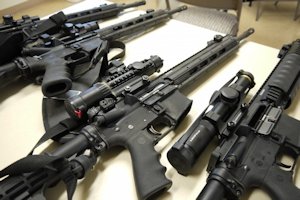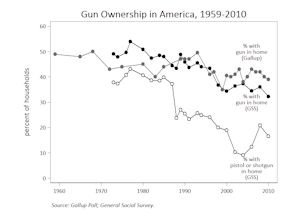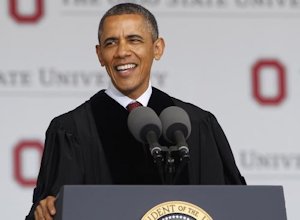Rethinking Gun Control, Part 1: Statement of Intent
 | | Ruger assault rifles |
Unless you've been living in a cave for the last year, you know that gun control has been an especially hot topic lately. Here in America, we've been struggling with our attitude toward guns since the birth of the nation, with passions running high on both "sides" of the matter, but as weapons technology and availability increases, has the basic debate undergone a paradigm shift? Many of our leaders are adamant about changing how the law approaches gun control, largely in response to many high profile cases of horrific gun violence of late (most notably the tragedy at Newtown, Connecticut). With that in mind, I'd like to purge myself of all my preconceptions and look at the debate from a strictly empirical viewpoint.
It would be impossible to discuss gun laws in America without discussing the politics behind the matter, and thus I won't even try to avoid politics. Quite the contrary, I intend to look very carefully into the founding of the Second Amendment to the United States Constitution, the judicial interpretations and legal challenges that have been raised towards it, the wisdom and plausibility of repealing it, and whether or not it makes sense in the Twenty-First Century. Some time should probably be spent on how we deal with mental health as it relates to potential violent crime, and what the political consequences are. I also intend to look at the recently failed Toomey-Manchin bill, which purports to tackle the so-called "gun show loophole" and require background checks for all gun purchases, and what it means that even this supposedly moderate approach was met with such rabid resistance. Perhaps I will also look into the pros and cons of other proposals currently in the pike as well as the recent history of similar gun control measures.
Most of all, though, I want to look at the underlying premises and assumptions of the debate, as I understand them. I'm going to assume that most Americans fall somewhere in the grey area at the center of the debate, not at the ridiculous extremes. I am not going to sit here are proclaim that everybody on the left wants to confiscate your guns or that everybody on the right wants people to be able to buy an assault rifle without any kind of oversight. As I also don't want to turn this into a war against a bunch of straw men, I am therefore going to start each subject with actual public statements made by public leaders who have influence on the matter, not with my prejudices.
 | | Guns are the leading cause of misleading statistics |
I also want to find raw data instead of well-worn talking points. Is it true that cities with the strictest gun control laws have the most gun violence? Can we determine which is typically the causal factor? How do gun control laws in other countries affect gun violence levels there? If America is truly the leader in per capita gun violence, can we determine if it is our laws--rather than something more deeply ingrained in our culture--that is to blame? Are guns an effective self-defense tool and/or crime deterrent?
I don't pretend that this is going to be an easy exercise. Indeed, I imagine it's going to be just as difficult and contentious a subject as Anthropogenic Global Warming, the last subject I gave such a thorough treatment. I also don't pretend to be capable of true objectivity, because it is my belief that nobody is capable of that. Therefore, in order for you to judge where I'm coming from and whether or not this exercise is capable of changing my opinions in the end, I will now explain my current beliefs on the matter.
I do not believe that there are any gun control laws or regulations that can completely eliminate gun violence in America, nor do I believe that anything short of a complete gun ban can make much of a dent in the numbers. Having said that, I am not opposed to good faith efforts to improve how we regulate guns that are careful not to interfere with the spirit of the Second Amendment, a legal standard that I do not believe is outdated. Even as a libertarian who is easily unnerved by anything that tinkers with my civil rights, I was surprised by the strength of the opposition to the Toomey-Manchin bill, a bill I felt was pretty reasonable (though I want to point out my opinion of the bill is based on what people were saying about it, because I have not yet looked at the actual text).
 | | "They'll warn that tyranny's always lurking just around the corner. You should reject these voices." -President Barack Obama |
To be clear, though, I am horrified that we have a president who is willing to proclaim that the people shouldn't be worried about government tyranny. I believe the main purpose of the Second Amendment is a check against tyranny that has little or nothing to do with hunting rights or personal security against muggers and burglers. Though we do live in a world where the government has unmanned aerial vehicles and state-of-the-art military hardware, I think it is just as important today as it was in 1776 that we have access to weapons that can be used against a tyrannical government. It is an extreme hypothetical, but I strongly believe that, if a civil war were to break out today, the people would be much better off with weapons than without. More importantly, I believe that an armed citizenry is far more likely to keep government power in check than an unarmed one.
I also believe that the vast majority of gun owners--over 99% of them--are safe, responsible people. I don't believe that a person with a gun is inherently more dangerous than a person without one, nor do I think people, in general, are too incompetent or stupid to be trusted with lethal weaponry. Still, there are limits. For example, I wouldn't trust even the members of my own family with a nuclear bomb (the world would end at the next Christmas gathering). I have tried very hard to find the dividing line between an acceptable weapon and an unacceptable one--because I am certain the line should exist--but I can admit that my search has been fruitless thus far.
Bottom line: I strongly support the Second Amendment, and my default mode when confronted with gun control proposals is defensive skepticism. I do not think talk of ammunition limits and gun show registration makes the slightest bit of sense if the goal is to prevent another Newtown, because the guns used in Newtown were legally owned, obtained, and registered by their owner. I think most gun control proposals out there are being written by politicians who just want to be seen as doing something--anything--and not by politicians who actually believe their proposals will make much of a difference. I am wary of unintended consequences, and if doing something--anything--invites such consequences without making much of a positive difference, then doing nothing is the superior option. I'm all for talking about it and trying to come up with solutions, but I also think we need to be prepared to deal with the possibility that there is nothing effective we can do that won't sacrifice our liberties. Owning a gun is a choice, and I believe it's a choice we should be allowed to make for ourselves, not a choice that should be dictated by politicians and bureaucrats.
Now that I've laid all that out, I want to try to prove myself wrong. If my beliefs can't stand up to empirical scrutiny, then I don't want to keep them. If, however, they do stand up to scrutiny, then this exercise will only strengthen by resolve. Let's find out, shall we?
-e. magill 5/7/2013
|
|